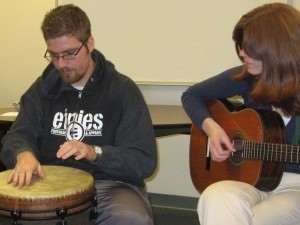Is Individual Music Therapy right for you?
By: Meredith Roman Pizzi, MT-BC
Here’s a fireside chat with Meredith about individual music therapy sessions.
1. What does individual music therapy look like?
 Meredith: In a typical individual music therapy session, the music therapist and client will engage in a variety of musical experiences including:
Meredith: In a typical individual music therapy session, the music therapist and client will engage in a variety of musical experiences including:
- singing
- playing instruments
- songwriting
- song recording
- lyric analysis
- active music listening
- movement to music
Individual music therapy is truly individualized! The client’s needs and goals are addressed directly in the musical interactions and active participation in music.
2. Do participants reach their goals faster in private sessions?
Meredith: Because individual music therapy sessions are designed to focus directly on the client’s needs and goals, participants do reach individual goals faster in private sessions. In group music therapy settings in school or afterschool programs, the primary goals are always related to the group. Individual participants do make definite progress towards their individual goals, however, they are not the focus of the entire group session.
On the other hand, in an individual session, the individual’s needs always come first. The music therapist is able to respond to whatever the client needs in the moment and although music therapy is still a process and takes time, consistency and engagement, individual progress is often seen more quickly in private music therapy sessions.
3. What can be accomplished in a 1:1 session?
 Meredith: One on One music therapy sessions are a great way to target and increase skills in the following areas:
Meredith: One on One music therapy sessions are a great way to target and increase skills in the following areas:
- expressive and receptive communication/language
- motor development
- self-awareness and awareness of others
- academic and cognitive areas
- sensory regulation
- behavior
4. When is 1:1 music therapy NOT the right choice?
Meredith: If the goals you are looking to address in music therapy are based on social skills and functioning within a larger environment, then individual music therapy is not the best choice. Skills like waiting and turn taking, asking and answering questions, increasing joint attention to group activities, and understanding socially appropriate behaviors are best addressed in a music therapy group format.
What are your questions about music therapy? If you have any other questions you would like to see answered about music therapy, please email me and I will answer them in a future newsletter.
